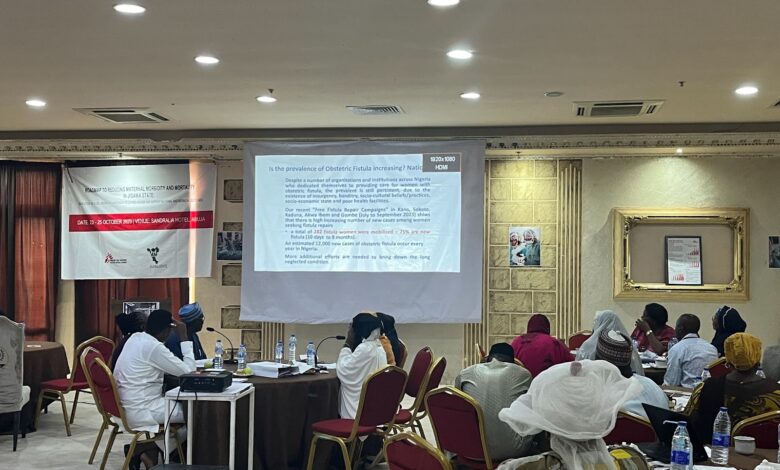Almost 50% Of VVF Patients In Jigawa Are Women And Girls Below 20
During a presentation by Dr Abdulwahab Mohamed, MSF's Medical Coordinator, MSF-France, it was revealed that more than 78 per cent of vesicovaginal fistula (VVF) cases were due to prolonged labour, with almost half of the patients receiving fistula surgery being young women and girls under the age of 20

During day 2 of a roundtable workshop organised by the international medical aid group, Medecins Sans Frontières (MSF) on ‘Reducing Maternal Morbidity And Mortality in Jigawa State’, deliberations were made by relevant stakeholders.
During a presentation by Dr Abdulwahab Mohamed, MSF’s Medical Coordinator, MSF-France, it was revealed that more than 78 per cent of vesicovaginal fistula (VVF) cases were due to prolonged labour, with almost half of the patients receiving fistula surgery being young women and girls under the age of 20 (1881 out of 4081 patients) between 2008 and 2023 in Jahun LGA, Jigawa state, northwest Nigeria.
The workshop, which entered its second day yesterday, is slated to round up today, Wednesday, Oct. 25.
So far, over 60 stakeholders from MSF, state and federal government, humanitarian organisations and other partners have gathered in Nigeria’s capital to dialogue on the medical organisation’s Jahun project, and the future of the 15-year project.
According to Dr Mohamed during his presentation, MSF had performed 250 first surgeries in 2022, and 191 surgeries between January and September 2023.
He attributed the decline in surgeries this year to a limited number of surgeons specialising in fistula surgeries, which is the project’s primary focus.
In addition to this, another member of the panel, Isa Musa from the Fistula Foundation, stated that despite several organisations and institutions across Nigeria dedicating themselves to providing care for women with fistula, morbidity is still on the rise due to a number of factors including insurgency, banditry, socio-cultural beliefs and practices, poverty, and poor health facilities.
“An estimated 12,000 new cases of obstetric fistula occur every year in Nigeria, and more additional efforts are needed to bring down the neglected condition,” Musa said.
Musa also gave suggestions on how VVF can be prevented on a more permanent basis.
“Grassroots advocacy is required, including engagements with community and religious leaders and the male folks in transforming traditional/cultural norms and gender dynamics influencing the persistence of obstetric fistula. We also need to train and engage fistula ambassadors as advocates of safe motherhood, raising awareness that fistula repair is possible and providing support to those with fistula to enable them to seek surgical care and reintegration,” he added.
One of the Jahun General Hospital patients, Hajara Muhammed, shared her experience with fistula, attributing its cause to her being married off in her early years of secondary school to a much older man, only to get pregnant one year later – before she even turned 15. She was left in labour for three days in the Hadejia General Hospital without being attended to by any medical worker. The prolonged labour led to VVF and obstetric palsy, affecting her ability to walk.
She was lucky enough to receive MSF’s intervention with a surgery at Jahun General Hospital and made a full recovery, leading her to regain her life.
Stakeholders in the room called on the Jigawa state government to give free fistula care a priority, train more local doctors and nurses on managing obstetric fistula, empower recovered patients with skill acquisition, and build the medical facilities and capacity of the health workers in the region to enable the standards outlive the MSF’s presence in Jigawa long after the project has concluded.
Dr. Kani Yamuna, a researcher and lecturer at the Federal University Dutse, and member of the Epicentre Steering Committee, noted one of the leading causes of maternal morbidity is low levels of girl child education in the region.
“Studies have shown that educated women are less likely to die due to pregnancy complications. Schools have also been found to be relatively safe havens for protection against GBV. Because of this, girl child education is a key strategy that will go a long way in reducing maternal mortality and morbidity, where girls grow to be empowered women,” she stated.
Support Our Journalism
There are millions of ordinary people affected by conflict in Africa whose stories are missing in the mainstream media. HumAngle is determined to tell those challenging and under-reported stories, hoping that the people impacted by these conflicts will find the safety and security they deserve.
To ensure that we continue to provide public service coverage, we have a small favour to ask you. We want you to be part of our journalistic endeavour by contributing a token to us.
Your donation will further promote a robust, free, and independent media.
Donate HereStay Closer To The Stories That Matter




